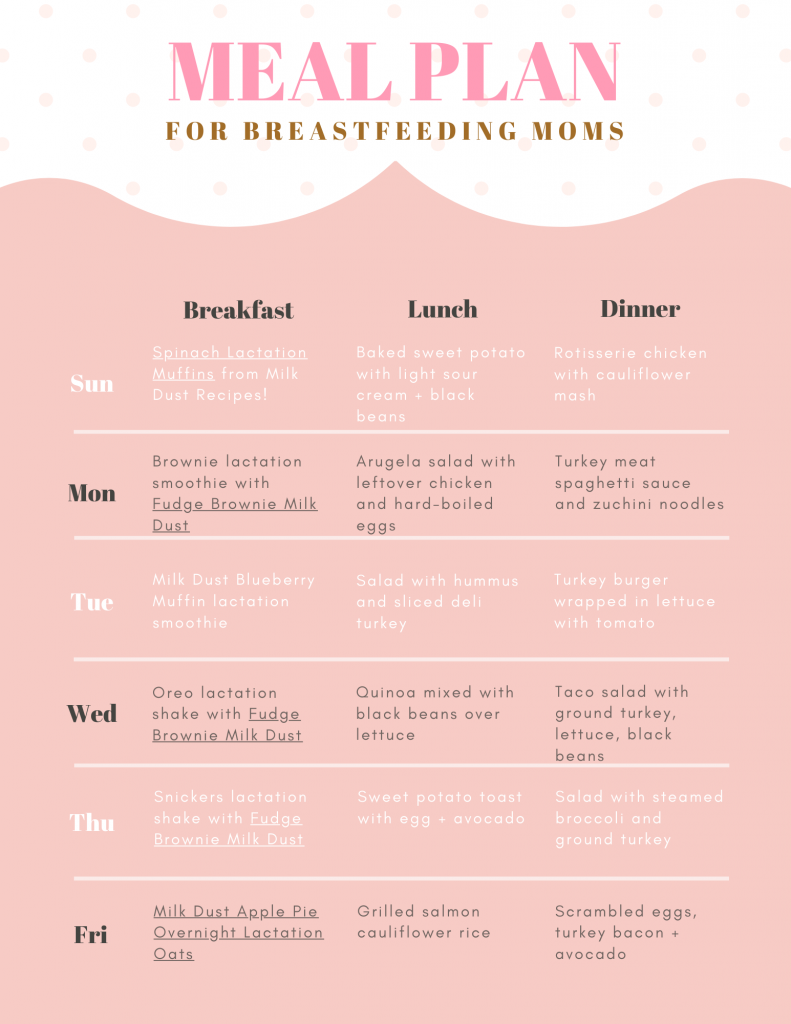A weight loss diet plan for lactating mothers can help them shed extra pounds while ensuring they have enough nutrients for breastfeeding. This article will provide tips and suggestions for safely and effectively losing weight while nursing your baby.
You’ll find information on creating a calorie deficit, including nutrient-dense foods in your diet, staying hydrated, and incorporating exercise into your routine. It’s important to keep in mind that weight loss should be gradual and sustainable to maintain your milk supply and support your overall health.
By following a balanced and healthy diet, you can achieve your weight loss goals without compromising your baby’s nutrition.

Challenges Of Losing Weight While Breastfeeding
Losing weight while breastfeeding comes with unique challenges for lactating mothers.
Changes In Nutrient Needs
During breastfeeding, mothers have increased nutrient requirements to support both themselves and their babies.
Impact On Milk Supply
Significantly reducing calorie intake can affect milk production, potentially jeopardizing the baby’s nutrition.
Breastfeeding Weight Loss Meal Plan: 7 Best Ways to Boost Your Health
Importance Of A Balanced Diet For Lactating Mothers
A balanced diet is crucial for lactating mothers, providing essential nutrients for both the mother and the baby. It supports the healthy development of the baby and helps the mother maintain her energy levels and recover from childbirth. A weight loss diet plan for lactating mothers should focus on nutrient-dense foods to ensure adequate nutrition while promoting gradual weight loss.
Nutrient-rich Foods To Include
Lactating mothers require a well-balanced and nutritious diet to ensure they have enough energy and nutrients to produce high-quality breast milk. Including nutrient-rich foods in their diet helps meet these requirements and supports their overall health. Here are some essential food groups for lactating mothers:
1. Protein-rich foods:
– Lean meats such as chicken, turkey, and fish provide high-quality protein, which is crucial for tissue repair and growth.
– Legumes, such as lentils, beans, and chickpeas, are excellent sources of plant-based protein.
– Incorporating dairy products, like yogurt and cottage cheese, also contributes to the protein intake.
2. Whole grains:
– Including whole grains like brown rice, quinoa, oats, and whole wheat bread provides essential carbohydrates, fiber, vitamins, and minerals.
– These grains stabilize blood sugar levels and provide sustained energy throughout the day.
3. Fruits and vegetables:
– Fresh fruits and vegetables are rich in vitamins, minerals, and antioxidants, which are vital for overall health.
– Colorful fruits and vegetables, like berries, spinach, kale, and citrus fruits, offer a wide range of nutrients to support lactation.
4. Healthy fats:
– Consuming sources of healthy fats, such as avocados, nuts, seeds, and olive oil, helps in the absorption of fat-soluble vitamins and provides energy.
– Including fatty fish like salmon and sardines boosts omega-3 fatty acid intake, which is beneficial for brain development in infants.
5. Calcium-rich foods:
– Adequate calcium intake is essential for lactating mothers to maintain strong bones and teeth and prevent calcium depletion in their bodies.
– Including dairy products, fortified plant-based milk, leafy greens like kale and spinach, and calcium-enriched tofu helps meet calcium needs.
Hydration Tips
Proper hydration is crucial for lactating mothers as it ensures an adequate milk supply and supports overall health. Here are some hydration tips for lactating mothers to stay hydrated:
1. Drink plenty of water throughout the day, aiming for at least eight glasses (8 ounces each).
– Keeping a water bottle handy can serve as a reminder to stay hydrated.
2. Include hydrating foods in your diet, such as watermelon, cucumbers, citrus fruits, and soups.
3. Limit caffeine and sugary beverages as they can cause dehydration. Opt for herbal teas or infused water for flavor.
4. If you find it challenging to remember to drink enough water, try setting reminders on your phone or using a water tracking app.
5. Consider consuming water-rich foods, such as smoothies, homemade popsicles, and foods with high water content like melons and grapes.
Creating A Safe Weight Loss Plan
When it comes to creating a safe weight loss plan for lactating mothers, certain considerations must be taken into account to ensure the well-being of both the mother and the baby. To make the weight loss journey both effective and safe, it is essential to consult with a healthcare provider, set realistic goals, and follow a balanced diet.
Consultation With A Healthcare Provider
Before embarking on a weight loss journey while lactating, consulting with a healthcare provider is crucial. A healthcare provider can offer personalized guidance based on the mother’s specific health needs and the nutritional requirements of the baby.
Setting Realistic Goals
Setting realistic weight loss goals is important to avoid any potential harm to the mother’s health or the quality of breast milk. Rapid weight loss can negatively impact milk supply and overall well-being. Hence, gradual and steady progress is key.

Recommended Foods And Supplements For Weight Loss
Losing weight while breastfeeding requires a balanced diet that provides essential nutrients for both the mother and the baby. By incorporating the right foods and supplements, lactating mothers can nourish their bodies, support milk production, and healthily achieve weight loss. Here are some recommended foods and supplements for lactating mothers to aid in weight loss:
Lean Proteins And High-fiber Foods
Eating lean proteins such as chicken, turkey, fish, and legumes can provide the necessary energy and muscle-building nutrients without contributing to excess weight gain. Incorporating high-fiber foods like fruits, vegetables, and whole grains can aid in digestion and create a feeling of fullness, helping control appetite and support weight loss.
Vitamins And Minerals To Focus On
Lactating mothers should focus on essential vitamins and minerals such as iron, calcium, vitamin D, and omega-3 fatty acids. These nutrients are crucial for maintaining energy levels, bone health, and overall well-being while supporting the demands of breastfeeding. Incorporating supplements as recommended by a healthcare professional can ensure adequate intake of these vital nutrients.
Incorporating Physical Activity Into A Busy Schedule
When it comes to losing weight while breastfeeding, incorporating physical activity into a busy schedule can be challenging for lactating mothers. However, it is important to prioritize postpartum fitness to maintain overall health and well-being. Engaging in regular exercise not only helps in shedding those extra pounds but also boosts energy levels and improves mood.
Simple Exercises For New Moms
As a new mom with a jam-packed schedule, finding time for exercise can be difficult. But incorporating simple exercises into your daily routine is feasible and essential. Here are a few exercises that you can easily perform at home:
- Brisk walking: Take your baby for a stroll in a nearby park or neighborhood. Aim for at least 30 minutes of brisk walking.
- Strength training: Perform bodyweight exercises like squats, lunges, and push-ups. Start with a few repetitions and gradually increase as your strength improves.
- Yoga or Pilates: Join a postnatal yoga or Pilates class, either in-person or online. These exercises help improve flexibility, tone muscles, and relieve stress.
Benefits Of Postpartum Fitness
Engaging in physical activity postpartum offers numerous benefits beyond weight loss. Some of the advantages include:
- Increased energy levels: Regular exercise helps improve stamina and reduces fatigue often experienced by new moms.
- Better mental health: Engaging in physical activity releases endorphins, which can help alleviate symptoms of postpartum depression and anxiety.
- Stress reduction: Exercise serves as a great stress reliever, allowing new moms to relax and unwind.
- Improved cardiovascular health: Regular aerobic exercises, like brisk walking or cycling, help strengthen the heart and improve overall cardiovascular fitness.
- Better sleep: Physical activity helps regulate sleep patterns, making it easier for new moms to get the rest they need.
Avoiding Fad Diets And Quick Fix Solutions
When it comes to postpartum weight loss, lactating mothers need to steer clear of fad diets and quick fix solutions. While shedding those extra pounds after pregnancy is a common goal, it’s crucial to prioritize the health and well-being of both the mother and the nursing baby. Avoiding drastic and unsustainable weight loss methods is essential for ensuring a safe and nourishing postpartum journey.
Risks Of Rapid Weight Loss
Rapid weight loss can lead to a range of potential risks for lactating mothers. Dehydration and nutrient deficiencies may arise when the body is not adequately nourished to support the demands of breastfeeding. Furthermore, sudden changes in diet or drastic calorie restrictions can hurt milk supply and quality, ultimately affecting the infant’s nutrition. It’s important to prioritize sustainable weight loss methods and consult with a healthcare professional to ensure the safety of both mother and baby.
Long-term Health Considerations
While the desire to achieve a pre-pregnancy weight may be strong, long-term health considerations should take precedence. Rapid weight loss can result in muscle loss, a slowed metabolism, and potential nutritional imbalances, which may have lasting effects on overall health. Prioritizing a balanced and sustainable approach to postpartum weight loss not only supports the well-being of the mother and baby in the present but also establishes healthy habits for the long term.
Monitoring Progress And Adjusting The Plan
One of the keys to success when following a weight loss diet plan as a lactating mother is to constantly monitor your progress and make adjustments as needed. By tracking your food intake and exercise routine, you can identify areas that may need improvement and make changes accordingly. This way, you can ensure that you are on the right track toward reaching your weight loss goals while still providing the necessary nutrients for your baby’s development.
Tracking Food Intake And Exercise
Tracking your food intake and exercise is essential to understanding your current habits and identifying potential areas for improvement. By logging what you eat and the activities you engage in, you can gain valuable insights into your calorie consumption and energy expenditure. This information allows you to make informed decisions about your diet and exercise routine, ensuring that you are maintaining a calorie deficit to support weight loss.
Here are a few ways you can effectively track your food intake and exercise:
- Keep a food journal: Write down everything you eat and drink throughout the day, including portion sizes. This can help you identify patterns and areas where you may be overindulging.
- Utilize mobile apps or online tools: Many apps and websites offer calorie tracking and exercise logging features. These tools make it easy to track your intake and amount of physical activity.
- Use a pedometer or fitness tracker: Monitoring your steps or other forms of exercise can give you a clear picture of your daily activity level. This can be especially helpful if you’re trying to incorporate more movement into your routine.
Making Changes As Needed
Once you have a clear understanding of your food intake and exercise habits, you can take the necessary steps to make changes that align with your weight loss goals. Keep in mind that these changes should be gradual and sustainable, ensuring that you are still receiving the necessary nutrients for both yourself and your baby.
Consider the following strategies when making adjustments:
- Focus on portion control: If you notice that you are consuming larger portions than necessary, try reducing your serving sizes to create a calorie deficit.
- Choose nutrient-dense foods: Opt for foods that are high in nutrients but low in calories, such as fruits, vegetables, lean proteins, and whole grains.
- Increase physical activity: If you find that you are not active enough, gradually incorporate more exercise into your routine. This can include brisk walks, light strength training, or engaging in activities you enjoy.
- Seek professional guidance: If you’re unsure of how to make changes or have specific dietary requirements, consulting with a registered dietitian can provide personalized guidance.
To make the necessary adjustments, it’s essential to listen to your body and be mindful of your specific needs as a lactating mother. Remember, weight loss should be approached with patience and care to ensure the health and well-being of both you and your baby.

Weight Loss Diet Plan for Lactating Mothers
Balancing Weight Loss Goals With Nutritional Needs Of The Baby
Lactating mothers who are hoping to shed the post-pregnancy weight face a delicate balance in ensuring they meet their weight loss goals while also prioritizing the nutritional needs of their babies. It is essential to navigate this balance carefully to safeguard both the mother’s health and the baby’s well-being.
Ensuring Adequate Milk Production
Losing weight while breastfeeding requires extra attention to maintaining a sufficient milk supply. Consume nutrient-dense foods and stay hydrated to support milk production.
Listening To Your Body’s Cues
Pay close attention to hunger and fullness signals. Avoid drastic calorie restrictions, as they can impact milk supply. Prioritize whole foods for optimal nutrition.
Frequently Asked Questions Of Weight Loss Diet Plan For Lactating Mothers
Is It Safe To Follow A Weight Loss Diet While Breastfeeding?
Yes, it is safe to follow a weight loss diet while breastfeeding, but it’s essential to ensure that you’re still consuming enough nutrients to support both your health and your baby’s development. Consult with a healthcare professional to create a safe and effective plan.
What Are Some Key Nutrients Needed In A Weight Loss Diet For Lactating Mothers?
Lactating mothers should ensure they get sufficient amounts of protein, healthy fats, and essential vitamins and minerals such as iron, calcium, and vitamin D in their weight loss diet. These nutrients are crucial for the overall health of both the mother and the baby.
How Can A Weight Loss Diet Plan For Lactating Mothers Help With Postpartum Recovery?
A weight loss diet plan for lactating mothers can aid in postpartum recovery by promoting healthy weight loss, increasing energy levels, and boosting overall well-being. It can also help in managing postpartum symptoms such as fatigue and mood swings, leading to a quicker and smoother recovery.
Conclusion
To sum up, this weight loss diet plan for lactating mothers provides a balanced approach to shedding those post-pregnancy pounds while ensuring optimal nutrition for both the mother and baby. By incorporating nutrient-rich foods, staying hydrated, and engaging in regular physical activity, mothers can safely and effectively reach their weight loss goals.
Remember to consult with a healthcare professional before starting any new diet or exercise regimen. Start prioritizing self-care and enjoy the journey towards a healthier you!
How Does a Dc To Dc Charger Work Master Your Power

🌿 Welcome! I’m Romana Yasmin Ayasha, deeply invested in fitness, nourishing foods, and mental health. My journey into these realms has been driven by a belief in the power of self-care and self-discovery.🏋️♂️ For me, fitness nurtures both body and soul. Whether sweating in the gym or finding peace on my yoga mat, I believe in the impact of lifestyle choices on our well-being.🧠Breaking the stigma around mental health is my mission. From mindfulness to therapy, I champion practices that nourish our inner landscape.🔍 I’m always seeking knowledge to share through evidence-based insights, practical tips, and personal stories. Let’s explore holistic health together!

